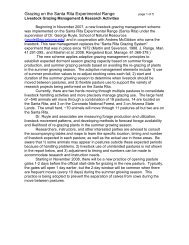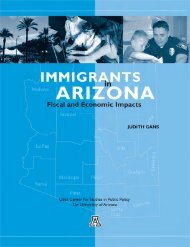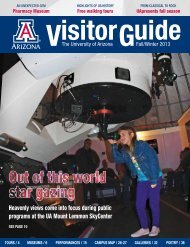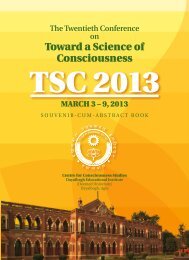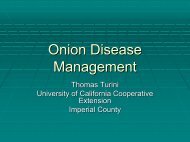CONSCIOUSNESS
Download - Center for Consciousness Studies - University of Arizona
Download - Center for Consciousness Studies - University of Arizona
- No tags were found...
You also want an ePaper? Increase the reach of your titles
YUMPU automatically turns print PDFs into web optimized ePapers that Google loves.
60 1. Philosophy<br />
can eventually see beyond the core self-identity representations, and personal history directing<br />
attention to reveal our true identity as awareness itself. In the expanded reflective capacity<br />
of meditation or peak experience or advanced spiritual development we can experience ourselves<br />
directly as the loving consciousness forming the structure all around us. P1<br />
41 How EPI are Phenomena: Velmans, Robinson, Dennett and Others Bill Faw<br />
(Psychology, Brewton-Parker College, Mount Vernon, GA)<br />
The word Phenomenon comes from philosophical Greek referring to the appearing to one,<br />
of sense data, mental images, or thoughts in the mind. Epi-phenomenon comes from more<br />
whimsical Greek for surface, superficial appearances. To argue that ‘consciousness’ has causal<br />
efficacy – does something to something – necessitates (a) defining what consciousness is and<br />
(b) specifying what consciousness does. Psychologist Max Velmans maintains that conscious<br />
experience creates a phenomenal world around us, and thus allows the universe to look in on<br />
itself, and that conscious experience is responsible for the development of science, but denies<br />
that conscious experience has causal efficacy, even in cognitive processing, citing Wegner, Libet,<br />
and others. Velmans appears to hold what I label a form of empirical epiphenomenalism,<br />
which I argue is contradicted by the bulk of modern consciousness science. Philosopher Bill<br />
Robinson presents a form of philosophical epiphenomenalism, in which phenomenalism and<br />
physicalism are given their due, but never the twain shall meet. For Robinson, the existence<br />
of tasks – which can be done only through activation of brain processes that also cause conscious<br />
events – is not an argument against ephenomenalism. Dan Dennett helps me articulate<br />
my intuitive sense that Velmans and Robinson mean very different things by epiphenomenalism<br />
– an empirical (psycyhological, physiological) epiphenomenalism versus a philosophical<br />
epiphenomenalism. I make a case against empirical epiphenomenalism, while remaining<br />
agnostic regarding philosophical epiphenomenalism – presumably the opposite moves that<br />
Dennett makes!. C9<br />
42 The Human Mind May be a Turing-Machine-Like System Even If the Lucas-<br />
Penrose Argument is Right Jenyu Liu (National Yang-Ming<br />
University, Taipei, Taiwan)<br />
The conclusion of the Lucas-Penrose argument is that the operation of the human mind<br />
cannot be the operation of a Turing machine. Many people conclude from this argument that<br />
the human mind can not be a Turing machine. Though in the strict sense, if we accept the<br />
conclusion of this argument, the human mind is not a Turing machine, it’s still possible that<br />
the human mind is very similar to a Turing machine. There are possible ways that make the<br />
human mind similar to a Turing machine. I will propose one possibility in this essay. The possibility:<br />
We can conceive the human mind as a Turing machine at a given time, and the human<br />
mind is a series of Turing machines, which change over time. This is coherent with the actual<br />
situation, for our brains are changing all the time. If so, we cannot apply the Lucas-Penrose<br />
argument on human minds. This is coherent with the actual situation, for our brains are changing<br />
all the time and we are learning all the time. So, we may conclude from the Lucas-Penrose<br />
argument that we are not a single fixed Turing machine, but we still can be a system of a series<br />
of Turing machines that change over time. If so, the Lucas-Penrose argument seems not to do<br />
many helps to convince us that human minds have more power than a computer. P1<br />
1.7 The ‘hard problem’ and the explanatory gap<br />
43 The Hard Problem and a Possible Solution Stephen Deiss<br />
(San Diego, CA)<br />
If accepted for a talk in Tucson, I will present a definition of consciousness that is intuitive<br />
and usable. From that definition I will show how it helps to reset the “hard problem.” The<br />
gist of the idea is that all our knowledge comes from how we interpret our sensations and<br />
then store them as memories to guide our future action. From a simple idea much ensues. P7



